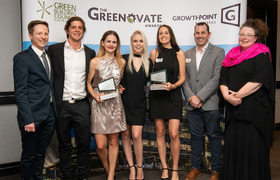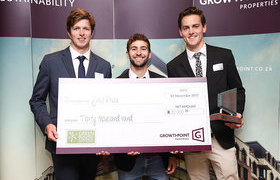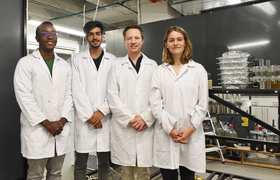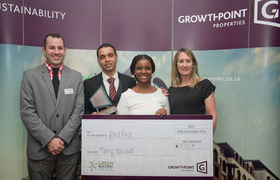Greenovate top spots for UCT students
03 December 2021 | Story Helen Swingler. Photo Mary Hilton. Read time 4 min.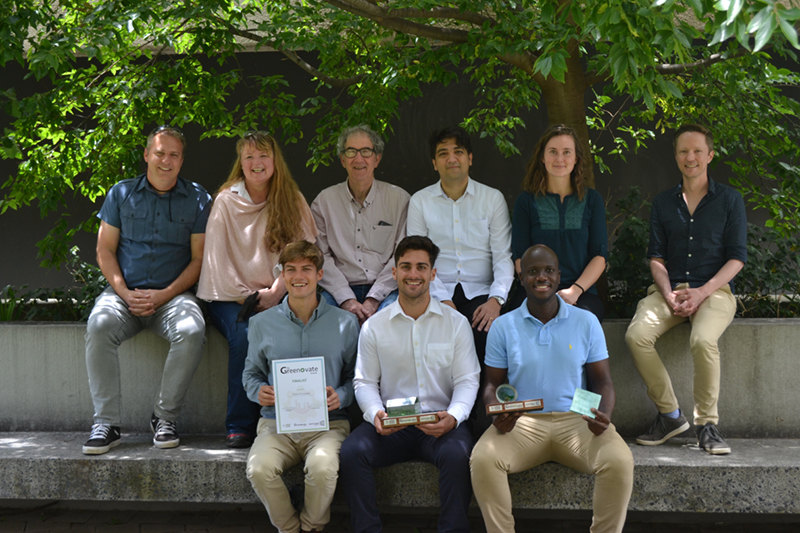
University of Cape Town (UCT) final-year Faculty of Engineering & the Built Environment students have taken the top spots in both the engineering and property and construction management streams at the prestigious Greenovate Awards once again.
In the engineering category Karabo Makole came up trumps, winning first place. In the property and construction management category, Tristan Fernandes was placed first and Barret de Willers third. Lizeri van der Berg and Jan Maré were finalists.
UCT’s Construction Economics Management (CEM) students have won five out of seven Greenovate awards since the competition was established in 2015, while civil engineering students have won their category in three of the four years they entered. The competition was only opened to engineering students in 2017.
A joint initiative by Growthpoint Properties and the Green Building Council South Africa (GBCSA), the competition challenges senior students to create innovative green solutions to environmental issues facing the property industry. In 2021, 22 students from five universities entered the awards: University of the Witwatersrand, University of Pretoria, UCT, North West University and Stellenbosch University.
Showcasing talent
The competition is open to final-year property studies, quantity surveying, construction management and engineering students whose thesis projects are entered into the competition by the various universities.
A statement from Growthpoint said, “The Greenovate Awards have been active since 2015 with the goal of seeding an early passion for sustainable development in university students by focusing on challenges and opportunities within the property industry. The programme also showcases
up-and-coming talent – the future leaders of the built industry. The result: a growing community of advocates for green building with a passion for creating a better world and a brighter, greener future.”
Fernandes’s thesis is titled “A life-cycle cost analysis of developing high-rise sustainable, innovative, affordable housing (SIAH) in South Africa”.
Makole’s thesis is titled “Manufacturing tiles from copper mine tailings using geopolymerization”.
Excellent record of UCT wins
Property and Construction Management Category
2015 – 1st and 2nd
2016 – 1st
2017 – 1st and 2nd
2018 – 1st
2019 – did not place in top three
2020 – 2nd and 3rd
2021 – 1st and 3rd
Engineering Category
2017 – 1st
2018 – 1st
2019 – 3rd
2020 – did not participate
2021 – 1st
Fernandes’s thesis was supervised by Dr Alireza Moghayedi, the co-director and senior research officer in the Sustainability Orientated Cyber Research Unit for the Built Environment (S+CUBE) and De Willers’s by Karen le Jeune.
Dr Moghayedi said, “Considering the low quality of life and accessibility of major affordable housing projects in South Africa, high-rise SIAH is a potential solution to this national dilemma. Tristan’s research proved that the high-rise SIAH is not only able to improve the life-cycle cost of houses and households but also enhance the quality of life of residents and minimise the adverse effects of urbanisation on the environment.”
“It is wonderful to see such innovative ideas emerge and be explored by these students through their final-year thesis projects.”
Civil engineering’s Associate Professor Dyllon Randall, who supervised Makole’s thesis (as well as the work of all previous UCT civil engineering student winners), said, “As we strive for a sustainable future, it is critical that we recover and reuse ‘waste’ streams. Karabo’s work shows that it is possible to rethink mine tailings as a valuable resource that can be used to make building materials such as tiles.”
Manfred Braune, UCT’s director for Environmental Sustainability, said: “It is wonderful to see such innovative ideas emerge and be explored by these students through their final-year thesis projects. As a university we hope that this will help catapult them into a career that allows them to put such sustainability ideas into practice.
“UCT would like to thank Growthpoint and GBCSA for this wonderful competition, for supporting all the students who participate every year and for creating an opportunity for these students to network with other like-minded students across the country and with potential employers.”
 This work is licensed under a Creative Commons Attribution-NoDerivatives 4.0 International License.
This work is licensed under a Creative Commons Attribution-NoDerivatives 4.0 International License.
Please view the republishing articles page for more information.







